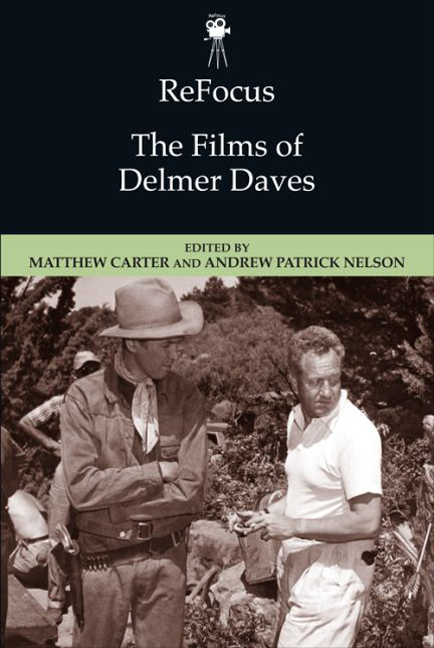Book contents
- Frontmatter
- Contents
- List of Figures
- Notes on Contributors
- Acknowledgments
- Introduction: “No One Would Know It Was Mine”: Delmer Daves, Modest Auteur
- 1 Don't Be Too Quick to Dismiss Them: Authorship and the Westerns of Delmer Daves
- 2 Trying to Ameliorate the System from Within: Delmer Daves’ Westerns from the 1950s
- 3 Bent, or Lifted Out by Its Roots: Daves' Broken Arrow and Drum Beat as Narratives of Conditional Sympathy
- 4 This Room is My Castle of Quiet: The Collaborations of Delmer Daves and Glenn Ford
- 5 Delmer Daves, Authenticity, and Auteur Elements: Celebrating the Ordinary in Cowboy
- 6 Home and the Range: Spencer's Mountain as Revisionist Family Melodrama
- 7 Delmer Daves’ 3:10 to Yuma: Aesthetics, Reception, and Cultural Significance
- 8 Changing Societies: The Red House, The Hanging Tree, Spencer's Mountain, and Post-war America
- 9 Partial Rehabilitation: Task Force and the Case of Billy Mitchell
- 10 “This Is Where He Brought Me: 10,000 Acres of Nothing!”: The Femme Fatale and other Film Noir Tropes in Delmer Daves’ Jubal
- Index
2 - Trying to Ameliorate the System from Within: Delmer Daves’ Westerns from the 1950s
Published online by Cambridge University Press: 15 September 2017
- Frontmatter
- Contents
- List of Figures
- Notes on Contributors
- Acknowledgments
- Introduction: “No One Would Know It Was Mine”: Delmer Daves, Modest Auteur
- 1 Don't Be Too Quick to Dismiss Them: Authorship and the Westerns of Delmer Daves
- 2 Trying to Ameliorate the System from Within: Delmer Daves’ Westerns from the 1950s
- 3 Bent, or Lifted Out by Its Roots: Daves' Broken Arrow and Drum Beat as Narratives of Conditional Sympathy
- 4 This Room is My Castle of Quiet: The Collaborations of Delmer Daves and Glenn Ford
- 5 Delmer Daves, Authenticity, and Auteur Elements: Celebrating the Ordinary in Cowboy
- 6 Home and the Range: Spencer's Mountain as Revisionist Family Melodrama
- 7 Delmer Daves’ 3:10 to Yuma: Aesthetics, Reception, and Cultural Significance
- 8 Changing Societies: The Red House, The Hanging Tree, Spencer's Mountain, and Post-war America
- 9 Partial Rehabilitation: Task Force and the Case of Billy Mitchell
- 10 “This Is Where He Brought Me: 10,000 Acres of Nothing!”: The Femme Fatale and other Film Noir Tropes in Delmer Daves’ Jubal
- Index
Summary
During the 1950s Delmer Daves wrote and directed a series of Westerns, but the two that have received the most favorable critical and popular acclaim—Broken Arrow (1950) and 3:10 to Yuma (1957)—were not written by him. This chapter assesses these generally more well-known films and two others for which the credits make no mention of Daves having contributed to the screenplay—Cowboy (1958) and The Badlanders (1958)—alongside two Westerns he not only directed but for which he is credited with having written the screenplay—The Last Wagon (1956) and Jubal (1956). Some attention will also be given to a Western he wrote but did not direct, White Feather (1955). Although the focus will be on these films, the suggestions being made here are seen as being relevant to other Westerns Daves directed in this period— namely, Return of the Texan (1952), Drum Beat (1954) and The Hanging Tree (1959). An attempt will be made to isolate for consideration a distinctive and consistent liberal imprint achieved by Daves in association with a series of screenwriters.
In the 1995 documentary A Personal Journey with Martin Scorsese through American Movies, Scorsese describes Daves as one of those “directors that are sadly forgotten today.” A cursory survey of online lists of “best” Westerns would seem to confirm this. Daves’ Broken Arrow and 3:10 to Yuma often receive a mention, although never within the really elite echelons, and Cowboy figures only very occasionally in a lowly position in the “top”100. The rest of the director's Westerns are almost never alluded to. This is despite the fact that the Western genre is one to which critics have considered Daves to have been well suited. At the same time, despite the lack of widespread acclaim from some cinephiles, his work continues to hold real interest. A series of screenings titled “Fortunes of the Western” shown in 2014 at the Harvard Film Archive Cinematheque, for example, included two of Daves’ Westerns, The Hanging Tree and Jubal. And, according to Kent Jones, Daves was “a true artist, a western specialist, and a Hollywood pro whose work was respected by insiders but received little in the way of official recognition.”
- Type
- Chapter
- Information
- ReFocus: The Films of Delmer Daves , pp. 63 - 79Publisher: Edinburgh University PressPrint publication year: 2016



